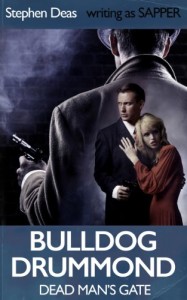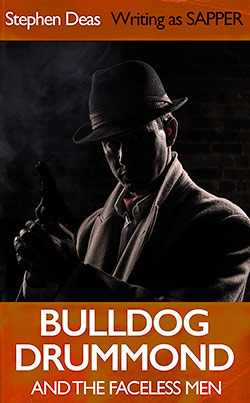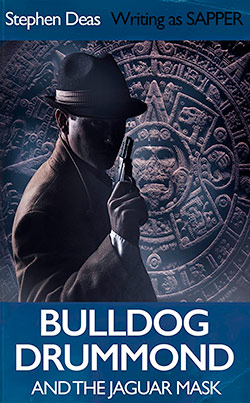The Long-Awaited Return of Bulldog Drummond
 Even more than the sinister Dr. Fu Manchu, Bulldog Drummond has become more and more obscure with each passing decade. The original ten novels and five short stories penned by H. C. McNeile (better known by his pen name, Sapper) were bestsellers in the 1920s and 1930s and were an obvious and admitted influence upon the creation of James Bond. Gerard Fairlie turned Sapper’s final story outline into a bestselling novel in 1938 and went on to pen six more original novels featuring the character through 1954.
Even more than the sinister Dr. Fu Manchu, Bulldog Drummond has become more and more obscure with each passing decade. The original ten novels and five short stories penned by H. C. McNeile (better known by his pen name, Sapper) were bestsellers in the 1920s and 1930s and were an obvious and admitted influence upon the creation of James Bond. Gerard Fairlie turned Sapper’s final story outline into a bestselling novel in 1938 and went on to pen six more original novels featuring the character through 1954.
While the Fairlie titles sold well enough in the UK, the American market for the character had begun to dry up with the proliferation of hardboiled detective fiction. By the time Fairlie decided to throw in the towel, the long-running Bulldog Drummond movie series and radio series had also reached the finish line. Apart from an unsuccessful television pilot, the character remained dormant for a decade until he was updated as one of many 007 imitations who swung through a pair of campy spy movies during the Swinging Sixties. Henry Reymond adapted both 1960s screenplays for a pair of paperback originals, but these efforts barely registered outside the UK.
Fifteen years later, Jack Smithers brought Drummond out of retirement (literally) to join up with several of his clubland contemporaries in Combined Forces (1983). Smithers’s tribute was a sincere effort that found a very limited market to appreciate its cult celebration of the heroes of several generations past. Finally thirty years later, Drummond is back in the first of three new period-piece thrillers from the unlikely pen of fantasy writer Stephen Deas. In a uniquely twenty-first century wrinkle, the three new thrillers are being published exclusively as e-books by Piqwiq.
 I’ll admit to a fair amount of skepticism on the selection of Stephen Deas as the continuation author. I didn’t fall prey to the common prejudice that suggests a fantasy author could not write a pulp detective thriller, rather my reticence was based on remarks the author made about the character and Sapper on his own blog.
I’ll admit to a fair amount of skepticism on the selection of Stephen Deas as the continuation author. I didn’t fall prey to the common prejudice that suggests a fantasy author could not write a pulp detective thriller, rather my reticence was based on remarks the author made about the character and Sapper on his own blog.
Admittedly, I am an anomaly. Even among the limited, but devoted audience for vintage pulp fiction, Sapper’s Bulldog Drummond books are looked upon with jaded eyes. They are frequently disparaged for displaying exceptionally racist attitudes during an era when racism was common.
By the Second World War, the books were being criticized as fascist and offensive. The later sequels toned the character down considerably and despite the property’s undeniable influence on the thriller genre, it would seemed to have passed the Rubicon of public tolerance. From that perspective, I expected something akin to a Sapper apologist to take up the reins and reintroduce the character. Stephen Deas may not have been the author I wanted, but it turns out he was the one the property needed.
 The first of the books to reach the digital market is Dead Man’s Gate. The setting is 1926, immediately following the events of The Final Count. Carl Peterson is dead and Hugh Drummond is feeling restless once more.
The first of the books to reach the digital market is Dead Man’s Gate. The setting is 1926, immediately following the events of The Final Count. Carl Peterson is dead and Hugh Drummond is feeling restless once more.
The novel’s opening echoes the first Drummond thriller (almost to a fault), but quickly sets down its own path. Deas establishes Inspector Wallis as a closer friend to Drummond than Sapper’s Inspector MacIver and adds the unexpected development of marital discord to Hugh’s relationship with Phyllis, who has grown tired of his insistence at recklessly pursuing the life of an adventurer. At times, Deas wanders between faithful recreation of the originals and a period-piece reboot. He is not overly concerned with continuity so much as creating a rollicking good story and yes, Dead Man’s Gate handily succeeds in being the most authentic Drummond thriller in sixty years.
Helping enormously is the creation of John Crabbleston as the heir apparent of Carl Peterson. Since Drummond is such a strong personality, the best books in the series were the few that saddled him with an equally strong opponent. Sapper’s love of outrageous humor is entirely absent here, but the relative seriousness of the socio-economic background to Crabbleston’s capers makes the absence of banter entirely appropriate.
I will note that Deas chooses to downplay the class differences that were so important to Sapper’s world. Denny’s confinement to the role of butler and social inferior, while the rest of Hugh’s former World War I squadron were his close friends and social equals is the most obvious example. Here, Denny is the only compatriot present and Algy and the rest find their place in the narrative taken by the working class laborers who find themselves exploited by Crabbleston under his guise as an idealistic communist leader.
While I found Drummond’s ability to navigate between clubland and the workingman’s pub a bit too easy, I suspect Deas simply wished to avoid making the character appear snobbish and narrow-minded to modern readers. From that perspective, I’m willing to accept the odd anachronism. I do wish the climax had not involved an airship, considering Peterson met his fate in one in the adventure that preceded this one in the character’s chronology, but Deas handles the sequence quite well. Just as I suggested The Final Count’s climax may have influenced Thomas Harris’s Black Sunday, Deas’s nerve-wracking climax appears to have taken the influence full circle.
It is no easy task to revive a vintage property, particularly when society’s mores and attitudes have changed radically since its commercial heyday. Deas acquits himself honorably and leaves me looking forward to Books Two and Three over the course of the next year. Here’s hoping we haven’t seen the last of John Crabbleston. It’s a joy to have Hugh Drummond face off against another villain worthy of Carl Peterson’s mantle. Now if only a print edition materializes somewhere in the future, my Luddite soul will rejoice. In the meantime, Bulldog Drummond is back at last and in the hands of a worthy author. Enjoy!
William Patrick Maynard was authorized to continue Sax Rohmer’s Fu Manchu thrillers beginning with The Terror of Fu Manchu (2009; Black Coat Press) and The Destiny of Fu Manchu (2012; Black Coat Press). The Triumph of Fu Manchu is coming soon from Black Coat Press.
I find it intriguing that, despite the notion that “normal” people hate comic books, prose literary heroes from prior decades have tended to have a rougher time since about 1970 in attempts to start television and/or film franchises, while indigenous, native to comic books heroes have had some success. Presumably, one should revert to the pre-Superman/Zatara heroes of 1938 if “normal” people hate comic books. Bulldog Drummond serves as perhaps an example of this trend.